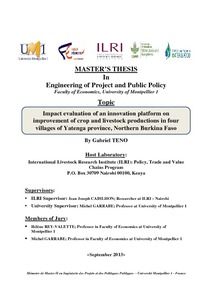Resource information
This study is linked to Volta2 project, launched in December 2010 for 3 years. Volta2 project has used innovation platforms as its principal development tool to achieve integrated management of rainwater for crop-livestock agroecosystems in 2 West African countries (Burkina Faso and Ghana). The aim of our study is to assess the impact of structure of innovation platform members, their conduct, and the consequence on the improvement of performance of crop and livestock production in four focal villages of Yatenga province, northern Burkina Faso (Ziga, Koura Bagre, Pogoro Silmimosse and Bogoya). The study was conducted from April to September 2013 with 2 months of field surveys between mid-May and mid-July 2013 in the four villages. This study was conducted through one approach borrowed from socio-economic theory: the model of “Structure – Conduct – Performance (SCP)”. The improvement in crop and livestock production was measured by asking farmers for their perception of this improvement. For data collection, focus group discussions and individual surveys with different stakeholders were used. Data analysis was carried through SPSS software, firstly for factor analysis to identify the dominant constructs of what makes innovation platform successful. And then, for regression analysis to determine the relationships between structure of innovation platform, the conduct of its members and whether they are achieving the objectives they set themselves in terms of improvement of crop and livestock production. Qualitative data was also interpreted to complete and interpret the results obtained through the analysis of quantitative data. Our study shows a positive impact of innovation platform, set up by Volta2 project, on IP member’s practices in Yatenga province. Innovation platform have contributed to the change of mentalities and conduct of its members in their activities. Indeed, through IP, its members have benefited from different support in their activities that have contributed to their capacity development, mainly by the reinforcement of their human and social capacity. The human capacity was improved through different trainings and advice received by IP members from different facilitators of innovation platform, such as training in animal and crop production, training in access to market, training in management of rainwater for crop and livestock production, etc. The social capacity of IP members was improved through new contacts and new partners that IP members have got in their activities. Indeed, through innovation platform, IP members of one village have entered in contact with IP members of other villages. Innovation platform have contributed to closer working relationships among IP members within the same village and to villagers gaining easier access to some organisations such as micro-credit organisations, animal husbandry and phytosanitary services of agricultural ministry, etc., which can help them to improve their activities. This improvement of human and social capacity of IP members has resulted in the improvement of crop and livestock production through a better exchange of information and knowledge between different stakeholders and a better access to different support services. Thus, our study shows a positive impact of innovation platform set up by Volta2 project for improvement of crop and livestock production in Yatenga province. These findings justify the necessity to support this kind of project in the perspective of reinforcing food security and reducing poverty in rural areas around the world.



